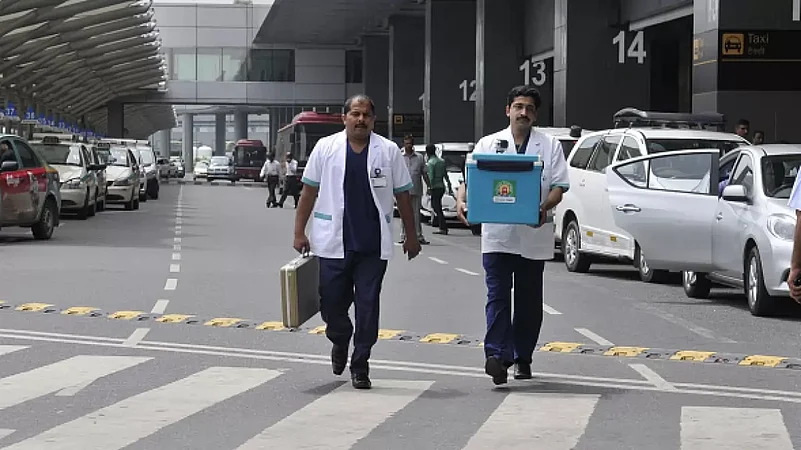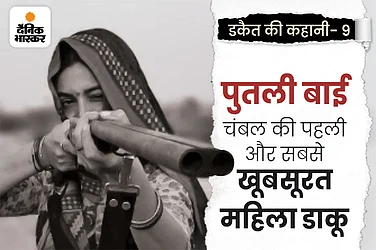A 55-year-old woman had gone out for a morning walk near her residence at Dera village in southwest Delhi when she lost consciousness and fell on the road. She was rushed to All India Institute of Medical Sciences (AIIMS) where doctors diagnosed that she was brain dead.
An alert was immediately sent to the National Organ Tissue Transplant Organisation (NOTTO) —responsible for the procurement, allotment, and distribution of organs— about a possible cadaveric heart donor.
The heart of the woman, whose relatives did not want to reveal her identity, was allocated to 19-year-old Aman*. A patient of dilated cardiomyopathy, which causes the heart’s ventricles to grow thinner and larger than usual, Aman had suffered heart failure. A team of doctors at Fortis Escorts Heart Institute, where Aman was admitted, performed the surgery to transplant the heart.
“The heart transplant was necessary in this case because the patient was in an advanced heart failure stage,” said Dr Z S Meharwal, executive director and head of adult cardiac surgery, VAD and Heart Transplantation Programme, Fortis Escorts Heart Institute.
But the surgery was challenging. Meharwal added, “There was a significant mismatch in the height and weight of the donor and the recipient.”
If the surgery had not been performed right away, the patient would have lost the chance for a transplant in a few days, said Meharwal.
Lagging behind others
Not everyone is as lucky as Aman*.
India lags far behind other nations in organ donation, which is estimated at 0.65 per million people in the country, according to Dr Harsh Vardhan, former health and family welfare minister of India. In comparison, Spain, which has the highest rate of donation, is at 50 per million.
In organ transplantation, however, India occupies the third position after the United States and China, according to the website of the Global Observatory on Donation and Transplantation.
“An estimated 1.8 lakh persons suffer from renal failure every year, however the number of renal transplants done is around 6,000 only,” claims the Directorate of General Health Services, which collects data about public health in India.
“An estimated 2 lakh patients die of liver failure or liver cancer annually in India, about 10-15 per cent of which can be saved with a timely liver transplant,” it added.
In India, the death rate for accidents is 53 per hour, according to a World Bank report titled Traffic Crash Injuries and Disabilities: The Burden on Indian Society. Doctors claim that even if the families of 10 per cent of the people who die in road accidents agree to donate the organs of the deceased, there would be no shortfall in the country.
But lack of awareness and infrastructure, as well as misinformation deters donations.
“There is a lack of awareness about brain dead cases,” said Dr Vishal Chadha, founding member of Dadhichi Deh Dan Samiti, a non-government organisation that works towards spreading awareness about organ donation.
“People think, if the heart is beating, there is hope. They confuse it with coma,” he added.
“A doctor does not unanimously declare someone brain dead. A patient is declared brain dead after the deliberation of the committee concerned at the hospital. This committee comprises a neurologist, an intensive care unit doctor, and two others. Then this information is shared with the NOTTO,” said Dr Vishal Rastogi, interventional cardiologist, Fortis Escorts Heart Institute.
Organ donation can be done only when the person’s heart is still beating — after it stops beating, the organs cannot be transplanted, he added.
“Organ donation is altruistic work. There is a need to create awareness about it,” said Dr Rastogi.
Overburdened hospitals
At government hospitals, the staff is often overburdened and thus, not too eager to pursue transplantation.
“At AIIMS, New Delhi, doctors sometimes pursue transplantation because it is a premier institution and the medical staff is well trained,” said a doctor who was earlier employed at the hospital.
He added, “But in most other government hospitals, doctors do not take such risks. Transplantation requires coordination with the state’s organ and tissue transplant organisation. Also, the task of convincing people to donate organs in small towns and villages is risky.”
Health infrastructure is also found wanting in many cases.
“In India, accident patients often do not make it to hospitals on time. The window in which organs can be extracted from the donor is very small,” said Dr. Rastogi.
For lungs, it is about four to six hours, for a heart it is four hours, and for a liver it is 24 hours.
In some cases, quick action by the doctors and the family of the donor can result in success.
In May this year, six-year-old Roli Prajapati was shot by assailants in Noida. She was rushed to AIIMS in New Delhi, where doctors declared her to be brain dead. They also convinced Roli’s parents to donate her organs.
Roli became the youngest donor ever at AIIMS. Her liver, kidney, cornea, and heart valve came to the rescue of those who needed these.
Her father, Harnarayan Prajapati, later told the media that Dr Deepak Gupta of AIIMS had told them about organ donation.
He said, “We thought about it and decided that she would continue to live in other people’s lives. She would give other people a reason to smile.”
* Name changed on request to protect anonymity

















